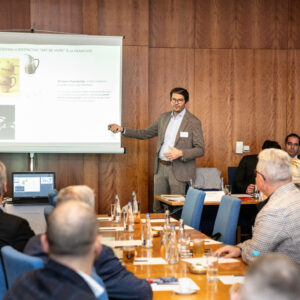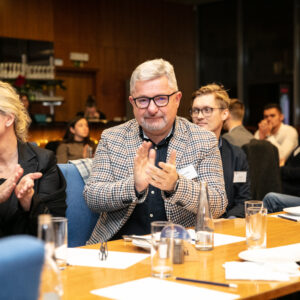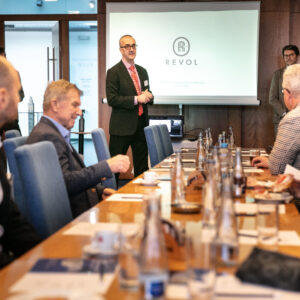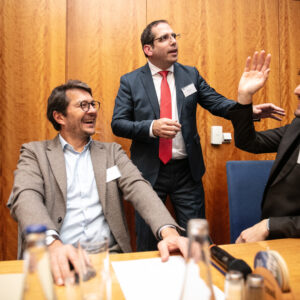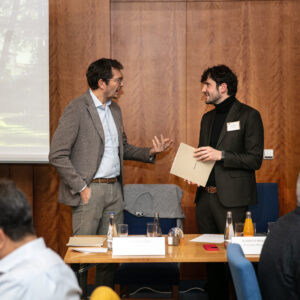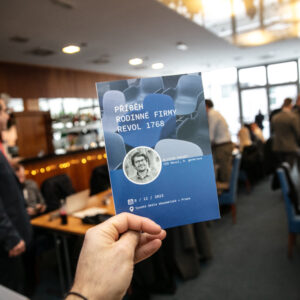Representative of the 9th generation of the French company Revol in Prague
A family business older than the French Revolution. Founded in 1768 near Lyon by brothers Joseph-Marie and François Revol. Their successors have passed on the tradition of porcelain production to this day. The current CEO and representative of the 9th generation, Olivier Passot, came to Prague to talk about the current operation of the 255-year-old family business Revol at a lecture for Czech family businesses, organised by the Centre for Family Business at the Prague University of Economics and Business on 8 December 2023. The role of moderator for the afternoon was taken by Alberto Brazzale from Brazzale Moravia a.s., another family business with more than 200 years of history, The representatives of both companies focused mainly on the following topics: overcoming crises, the relationship between innovation and maintaining tradition, succession and the approach to the distribution of shares in family companies.
Crisis as an opportunity
The history of business is like the history of overcoming crises. Just in the list of crises that family businesses have gone through, we can find the most challenging periods of world history: the First World War, the “Black Friday” of 1929, the Second World War, the oil crises of the second half of the 20th century, the period of economic change after 1989 and, last but not least, the crisis associated with the Covid-19 epidemic that closed hotels and restaurants from one day to the next – 55% of Revol’s clients.
Olivier Passot paused at the first major crisis he experienced as an employee of the company. Two years after he joined the company and was put in charge of the US market, the company had to face an unprecedented onset of competition. In 2001, China became a member of the World Trade Organization (WTO) and all restrictions on the supply of Chinese goods to the European market fell. Overnight, porcelain that was 10 times cheaper than that bearing the Revol brand began to be sold in France. Revol’s customers cancelled their contracts in large numbers and went to competing suppliers. “We knew that if we wanted to maintain our production and our company, our business had to change from the ground up. We gambled on sustainability and the design of our products, on innovation overall. In fact, now in 2001, I’m grateful for the leap the company made because of it. We went from simple white utility products to colourful design things. Our products are now recognizable at a glance. And we’ve moved into the niche brand segment. For example, we supply Nespresso, Dyptique, Cartier… we have completely changed our original direction,” Olivier Passot described during his Prague appearance.
Innovation VS tradition
The two-century-old company owes its existence and its current market position to traditional practices and history, as well as to innovation, which forms the core of the company’s strategy and, in fact, the essence of the Revol brand. Family-owned companies have a unique opportunity to use these two principles to their advantage. “Tradition is important so that we know who we are. In a company that has over 200 employees in total, two full-time people are dedicated to charting our history. Knowing and remembering tradition is important. At the same time, I see innovation as the key to success. We have a whole department in the company dedicated to innovation, and innovation is at the heart of our strategy and the company itself,” explains Olivier Passot. As an example, he cited the move where the porcelain company decided to invest in the development of its patented Recyclay technology, which allows it to produce products even from a previously waste component of the input material. “In my opinion, it is essential that every decision we make takes into account the long term. All the strategies in our company are thinking about the long term,” he said, adding that when he considers his role in the company, it is not just to generate profit, but to pass it on to the next generation in even better shape than when he took it over. “Investing in innovation is the means to achieve that,” Passot clarified.
Family succession strategy
“I don’t have a clear answer as to how it is that nine times now Revol has been able to pass on to a younger generation. We have all been resilient, persistent. Maybe the company is part of our DNA,” joked Passot. “I can only hope that one of my four children will want to continue, but at this point I don’t know. However, my eldest son might be suitable for the role of CEO. But I want to give him time, not to put any pressure on him, that would only discourage him,” he added.
So Revol does not yet have a clear future in terms of succession. Olivier Passot, however, likes the same scenario that his father, Bertrand Passot, chose a few years ago. At the age of 52, he said he would like to hand over the company to his successor at the age of 60. Olivier Passot – the eldest of the 4 siblings – thus took up the newly created position of US market manager after several years of working outside the family business. And in 2007, at the age of 36, he became the new CEO of the company. His younger brother Amaury naturally had less experience at the time, so the choice was up for grabs. Today, both brothers work at the company.
And what demands does Olivier Passot have on his successor? “The condition is to have at least 5 years of experience outside Revol and I stick to the principle that having the right surname is not enough. My successor must prove that he is a true leader. As family business owners, it is our responsibility to recognize who among our potential successors can perform the role of a leader and who is not up to it. We need to be able to self-critically assess what each family member is talented at and choose an appropriate succession strategy accordingly. Otherwise we are damaging the family,” Passot thinks. “My father did it wisely. He set a clear age limit for when I, as his successor, would have to fully take over the running of the company. His intention was that the company would be able to exploit my age-related potential. Like him, I think that the attitude of young people is important for business,” said Olivier Passot.
Considerations on the division of shares in the company
The history of Revol has been marked by crises caused by succession and the division of shares among family members. Today, Olivier Passot and his brother control 96% of the company’s shares. He puts the transmission of family values at the forefront of educating his children about succession and responsible ownership. After this priority, there is room for other things in education: travelling, learning languages, playing sports, which is important for a sense of competition. “I want my children to gain as much experience as possible. To try their own business or work in a field that appeals to them. I want to encourage them to discover what they really enjoy and what they don’t,” Olivier Passot described. As already mentioned, he wants to choose a personality leader as his successor. This is, by his definition, someone who can anticipate problems. And if it’s not one of his children? “We would probably choose a CEO outside the family, but I want the family to control our business financially. The company is our family priority,” Olivier Passot concluded his speech.
Distribution of shares in a family business
Currently, Olivier Passot’s family and his brother control a majority stake in the family business. “It’s hard to do business if you don’t have shares in it,” thinks Olivier Passot. He is now considering splitting the shares of his descendants in a newly created legal entity under which Revol will be incorporated, with its own leadership structure separate from the family one. “You can’t get the leadership of the company, you have to accept it. A lot of family firms have made the mistake of handing over leadership to younger family members in an ill-advised way and it has turned out badly. I don’t see it as an option to have only family members on the board. Therefore, the possibility of having a board made up of professionals who are not family members should be considered,” he explained, adding that as owners, they need to look critically at who in the family is talented at what. To do otherwise would be detrimental to the family.

